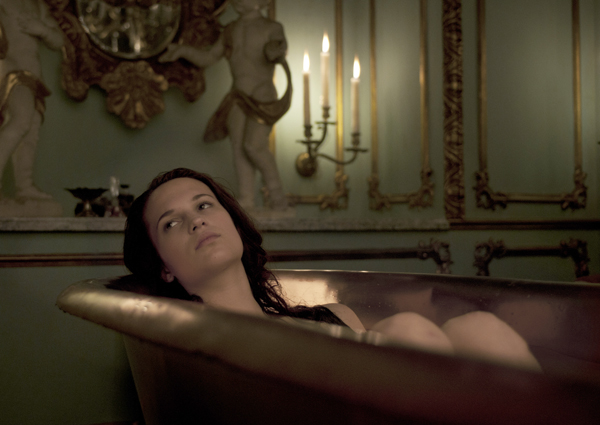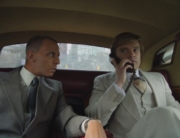
Alicia Vikander as Queen Caroline Mathilde in A ROYAL AFFAIR (Magnolia Pictures)
Nikolaj Arcel, having co-written the first film version of The Girl with the Dragon Tattoo, may also be something of a starmaker. Actress Noomi Rapace, the original and visceral Lisbeth Salander, has gone Hollywood, starring just this year alone in Ridley Scott’s Prometheus and Brian De Palma’s glamo-thriller Passion. Arcel’s new film as a director, A Royal Affair, has the makings of a vehicle for his newest lead actress, the doe-eyed Alicia Vikander. It doesn’t hurt that she has the delicate bone structure of Natalie Portman or the steeliness of Elizabeth Reiser. Arcel takes her, moment by moment, through a transition from a young bride to a disgraced queen. He films her mostly in close-ups, where she reveals enough while retaining some mystery. As long as Vikander’s on screen, she brings a pulse to this beautifully lit period piece. (Look for her as a blond Kitty in the new take on Anna Karenina with Keira Knightley).
The film follows a pattern from other costume dramas based on historical figures, recently The Duchess or even Josef von Sternberg’s The Scarlet Empress: the 1769 marriage of 15-year-old British Princess Caroline Mathilde to a boorish man-child, the Danish King Christian VII (Mikkel Boe Folsgaard). Christian hides when he first meets her, eats with mouth open, laughs uproariously at his own poor attempts at humor, and even hisses at her when she irritates him, which is often. He wants a “fun” queen and prefers to spend his evenings in brothels. Initially, Caroline Mathilde’s uncertain if her husband is petulant because the court indulges his every whim (his ministers bow to him even while he has sex with a prostitute) or if he’s erratic, if not crazy. (One minister blames his behavior to excessive masturbation.) There’s also a tinge of the competitive Princess Diana/Prince Charles drama when Christian warns her “Don’t steal my light,” after she has impressed the court with an impromptu harpsichord concert.
At first, Caroline Mathilda, now queen, is threatened by the arrival of the king’s personal doctor and confidant Johann Friedrich Struensee (Mads Mikkelsen); he’s the only one who calms the king and actually tells him what to do. He appeals to the monarch’s thespian vanity, directing him to preside over his entrenched royal council as though he’s playing a role. And it works. The monarch, who has no grasp of the issues, hams it up. Because of Struensee’s paternal influence, the king demands reforms to be approved by the council: no more censorship, rights for serfs, and national smallpox inoculations. With so much influence, Struensee becomes the de facto power behind the throne.
Unlike Marlene Dietrich’s randy Catherine the Great from Scarlet, Caroline takes solace in only one relationship, with Struensee, a romance which begins with a book, and a banned one at that, when he lets her borrow a revolutionary volume from his personal library. She’s been famished; many of her books from England never arrived, all were on Denmark’s censorious no-read list. With Rousseau’s philosophy that “Man is born free, and everywhere he is shackled” serving as foreplay, it’s only a matter of time until Struensee receives a discreet letter from the progressively like-minded queen—instructions to a secret passage to her bedroom. (The film’s title sums up the plot in a nutshell.)
This is history made easy—neither a Scandinavian history degree nor a background in the Enlightenment is necessary. However, Queen Caroline becomes a bit player in the second half, a pawn in the political machinations. Her chief nemesis is the Queen Dowager Juliane Marie (Trine Dyrholm), who has ambitions for her own son, the king’s stepbrother. The rivalry is fleetingly introduced when Caroline Mathilda first arrives in the Danish court, and reappears again in the third act. Yet this is where the tension lies, arriving very late in the undercooked 137-minute movie, which otherwise depicts—plot point by plot point—the rush and recriminations of Caroline Mathilda and Struensee’s love affair. All despite intimations throughout the film that it wants to burst out of its corset and get down-and-Dangerous Liaisons dirty. Because the script sidelines the tensions within the royal family, the political backstabbing becomes less personal and more like a history lesson in fancy dress, when why we’re watching an 18th century version of Royalty Magazine is to eavesdrop on these palace intrigues.






Leave A Comment